- Home
- Naguib Mahfouz
The Mirage Page 2
The Mirage Read online
Page 2
The young man came forward and asked for her hand. He had neither a job nor an education. In fact, he had no money, at least not at that point. However, he was one of two sons of a man who was both well known and well-to-do. When my grandfather learned that the young man’s father had agreed to the proposed marriage and was prepared to support his son and his family, he was thrilled with the engagement and delighted with this old, respectable family’s wealth and prestige. He was told that the suitor was as ignorant as a plebeian. “What does he need with an education?” he replied. He was told that he had no job. “And what does he need with a job?” he asked. In fact, he was told frankly that he was a young man with untamable passions and that he was a riotous drunkard. And to this his reply was that he knew that he was just a young man, and not a monk. My grandfather wasn’t greedy or covetous. However, in addition to his being somewhat dazzled by the name of the family that wanted to become related to him by marriage and his confidence in their fine reputation, he wanted happiness for his daughter, and he believed that money would be sufficient to achieve it. Besides, my grandfather himself hadn’t finished primary school, and had a penchant for drinking and gambling.
Thus it was that his daughter became the wife of Ru’ba Laz, or Ru’ba Bey Laz, as he was generally known. My grandfather supposed that by marrying off the younger of his two daughters, he’d relieved himself of his duties toward her. However, barely two weeks after their wedding night, my mother returned to my grandfather’s house, tearful and broken-hearted. Hardly able to believe his eyes, my grandfather was exceedingly upset. Then he learned that less than a week after his wedding, the young man had resumed his former way of life in pubs, that he wouldn’t come home before sunrise, and that he’d beat her violently on the day she left his mansion.
My grandfather was appalled. Despite his strict military upbringing, he was tenderhearted and was ever so solicitous toward his two daughters. Consequently, he was enraged over what had happened and took off straightaway for the Laz mansion, where he loosed the full force of his force on both the young man and his father. My mother stayed in my grandfather’s house until she gave birth to my older sister. After this, a group friendly with both sides went to work to patch things up and bring the couple back together. Their efforts were crowned with success, and my mother and her baby girl returned to the Laz mansion once again. Her stay there lasted for two months, after which her patience ran out and she left once more, broken-winged, for my grandfather’s house. The fact is that she hadn’t known more than a few days of comfort. She had persevered, however, resigning herself patiently to the situation in the hope that the passing of the days would reform what was corrupt. But he only grew worse, and no longer could she see anything in him but a rowdy drunkard who held nothing sacred. So, despairing, she sought refuge in her father’s house. The man tried to get her back, admitting his addiction to drink and trying to convince my grandfather that married life would be possible even with his addiction. However, my grandfather took a hard stance with him and insisted that he divorce her. Some months passed and my mother gave birth to my older brother. She went on living under her father’s wing, enjoying his affection and tender, loving care.
During those days she heard bizarre reports concerning Ru’ba Laz according to which, in a moment of impetuosity and greed, the reckless young man had tried to poison his father in the hope of hastening his portion of the inheritance. However, the father had discovered the crime through the cook and banished his son from the mansion. He then decided to set half his bequest aside as a religious endowment and bequeath the other half to his elder son. It appears that he may not have been willing to bequeath all of it to the elder brother for fear of endangering him by stirring up his younger, wicked son’s rancor against him. Be that as it may, it thus happened that after having dreamed for so long of a vast fortune, Ru’ba Laz woke up to find himself in relative poverty. All he possessed now of this world’s vanities was a quarter of a family endowment that he had inherited from his mother (who wasn’t his brother’s mother), which came to around forty pounds a month, and a two-story house in Hilmiya into which he had moved after being evicted from his father’s home. The news brought anxiety and distress to my grandfather’s household, troubling the hearts of those who feared for the future of the man’s two young children. As a result of the disinheritance, the support they received was reduced to a mere pittance, and their future looked bleak. My grandparents and my mother consulted together concerning the matter, and it was decided that my grandfather would meet with Laz senior and attempt to win his sympathy on behalf of his two innocent grandchildren in the hope that he might change his will for their benefit. My grandfather went to Laz’s mansion and spoke with the man. But he was met with a hard heart and deaf ears. In fact, the man cursed both his son and his son’s progeny in my grandfather’s presence, whereupon he returned home, saddened and enraged.
One of the ironies of fate was that Laz’s father died the very year in which his son had tried to do away with him. Seven years then passed. My sister Radiya was eight years old and my brother Medhat was seven or thereabouts. Those days witnessed an event that changed the tranquil course of our family’s life. As fate would have it, the change took place as a result of a trivial incident of the sort that happens when one is walking down the street. As my grandfather was leaving a gambling establishment on Imad al-Din Street a little before dawn one day, he saw a bunch of hooligans gathered around a gentleman and beating him as he stumbled about in their midst, fuming and reeling. My grandfather shouted at them to leave the man alone, then approached them in a rage. He was joined shortly thereafter by a policeman. The mob scattered, and who should my grandfather see but Ru’ba Laz with a bloodied nose and in an obviously drunken state. Despite being startled and disconcerted, my grandfather came up to the man without hesitation and supported him with his arm, seeing that he was on the verge of falling. By this time all that had transpired between them in the past had been forgotten, or nearly so. At the same time, and in spite of the man’s unpredictability and riotousness, he’d been consistent in sending financial support to his two children. Consequently, there was no enmity between the two men. My grandfather summoned him over to his Victoria and he obeyed. Then my grandfather instructed the driver to go to Hilmiya. A peculiar silence fell over the two men along the way, and neither uttered a word. When the carriage reached the house, my grandfather cleared a space for Ru’ba Laz to get out, but he grabbed hold of my grandfather’s arm and invited him inside. My grandfather declined apologetically given the lateness of the hour. Still inebriated, the man wouldn’t take no for an answer and insisted that my grandfather come in with him. Against his will, he surrendered to the younger man’s wishes, and as dawn’s blue threads began mingling with the darkness, the two of them made their way together to the reception room.
Ru’ba Laz threw himself down on a chair, then drew my grandfather toward him and sat him down on a seat near him. Before long his silence had left him and he was overcome with agitation and emotion. With a heavy tongue loosed by a combination of alcohol and anguish, he said, “Did you see how those rascals punched and slapped me? Do you see what an insult this is to my dignity? After all, I’m Ru’ba the son of Laz, denizen of this old, venerable residence! That’s the world for you, Uncle. But why should I call you my uncle? I’m over forty years old now, and you’re barely over fifty, so it would be more fitting for me to call you my brother. But I call you my uncle out of admiration and respect, since you’re like a father to me. May God forgive me—you’re greater and more venerable even than that! Pardon me for the things I’m saying. After all, words are trivial things. As for being kicked by a gang of thugs, it’s a serious matter, wouldn’t you agree? My father died angry with me, and they say that no one who’s been deprived of his parents’ approval will ever achieve happiness. Is that really true, Uncle? Even if one of those two parents was my father? Lord, I’m fed up with this world. It’s nothing but fever, delirium,
and madness without end. Oh, what I’d give for calm and peace of mind. Isn’t this what they call regret? Give me your hand, Uncle, and let’s swear by this new morning to make a new start, without wrongdoing or debauchery. Send me my wife and children and let my family live with me. Please!”
His eyes grew redder and redder until my grandfather thought he was weeping, and he felt he had no choice but to comply with his request. By the time the Victoria took off with him in the direction of Manyal, the streets had begun filling little by little with people coming out in pursuit of their daily bread. As the carriage moved along, he closed his eyes with satisfaction and thought at length about the matter. He wanted to see his daughter become the mistress of a household of her own. That very month, my mother was sent back to her former husband and the family was reunited. However, this new life only lasted for two weeks. In fact, it may not have lasted for more than a single day. As for the remainder, my mother endured it patiently until, fearful that the wild drunkard might do harm to her two young children, she picked them up and fled back to my poor grandfather. In a violent rage, he betook himself forthwith to the phony repentant and raked him derisively over the coals. Ru’ba Laz listened to him in silence. Then he told him that his wife was to blame for not wanting to live with him, and that his only fault was that he got drunk. My grandfather took leave of him in a miserable state, divorce certificate in hand.
It was then that their married life ended once and for all, and I was the fruit of that bogus repentance. My grandfather once said to me jokingly, “You came into this world on account of my stupidity and no one else’s!” Many indeed are those who have come into this world on account of stupidities.
I grew up in my grandfather’s house, which was the only home I ever knew. In fact, the only family I knew was my grandfather and my mother. By the time I was old enough to be aware of what was happening around me, my father had reclaimed my brother and my sister and my grandmother had died. I only learned that I had a father based on the things my mother said about him in bitterness and sorrow, and my hatred for him grew with the passing of the days. Then, as if he hadn’t been cruel enough to my mother already by taking back his son and daughter, he prevented them from seeing her. Year after year passed without her catching even so much as a glimpse of them. At the same time, we heard it said that the man virtually imprisoned himself at home, fleeing from the world and those in it by keeping himself in a state of perpetual inebriation.
4
My grandfather’s house in Manyal was my birthplace, my playground, and my world. It consisted of two spacious stories, of which the upper one was where we lived, and a small courtyard. I don’t want to talk about the house. At the same time, I long to recapture the past, and what past is there but that it has a house around which its memories hover? My life is inseparable from that house, and will remain so for as long as I live. Of course, a house isn’t just a building. Rather, it’s a tower fixed in time to which the doves of memory repair for refuge, cooing with nostalgic longing for what’s passed of our lifetimes. So let me delve into the depths of the past for whatever waves of memories my head can receive. I close my eyes, disappearing from the world of things tangible, hoping to provide my spirit with the stillness it needs to take off into the eternal past. Let me confess that I long intensely for the past, and that of late this longing of mine has become a veritable ache. Perhaps this is nothing but a yearning for childhood. I realize what a serious thing such nostalgia and longing can be, since herein lies the secret of this regrettable malady of mine. Yet, although I’ve lived my life looking to this past, whether happily or otherwise, and despite my awareness of the powerful bond that draws me back to it, I still stand helpless before its impenetrable veils, and my memory retreats wearily from even its most critical and important eras.
I close my eyes full of anticipation and questions. Out of the darkness my eyes glimpse a faint light. I see my small hand as it reaches for the moon from atop my mother’s shoulder. What a memory! How often have we reached for moons that are no less unattainable? I recall the tremendous effort I once expended trying to take hold of my mother’s nipple, only to be thwarted by something with a bitter taste; tugging with delight on my grandfather’s crescent-shaped mustache; and shattering the flower pots, one of which landed on and nearly broke the Nubian gatekeeper’s arm when it plummeted off the edge of the balcony. Most days I would refuse to go to sleep until I’d climbed onto my mother’s shoulder and had her carry me the length and breadth of the house, and whenever she slowed her pace, I’d spur her on with my feet. I used to strut about constantly in girls’ dresses, my hair hanging down to my shoulders. One day my mother had the idea of making me a military uniform complete with stars and medals, so I put it on gleefully and proceeded to traverse the length of the house with a haughty, self-satisfied gait: the distinguished officer with a braid dangling down his back. My grandfather didn’t approve of such gratuitous pampering. However, he had no time to oversee my upbringing, since he generally didn’t get up till noon and wouldn’t return from the casino until nearly dawn. Besides, he feared upsetting my mother in view of the ill-fortune life had dealt her, and because she was all he had left in his old age. Thus the three of us lived: the father who had no one but his daughter, and the daughter who had no one but her son.
My mother would snatch at memories of my sister and brother with a tearful eye and a broken heart, and she yearned passionately to see them if only for an hour. And since, in her sorrow, she found no solace but me, she would set me in her lap and not want me to leave it. Indeed, she would have liked me to make it my entire world.
Life’s breezes blew gently. Thus, I didn’t realize until after it was too late that it was an unwholesome affection which had exceeded its proper limits, and that there’s a kind of affection that destroys. She had been cut to the quick in that place where her motherly instincts lay, and in me she found solace, comfort, and healing. She devoted her entire life to me. I would sleep in her lap and spend my day on her shoulder or elsewhere in her presence. Even during those brief times when she was busy with household affairs, I wouldn’t leave her, or rather, she wouldn’t allow me to leave her. In the kitchen I’d ride on her shoulder, resting my cheek on her head as I amused myself watching the cook light the fire, cut up the meat, and chop the onions. We would even take baths together. She would place me naked in a washtub, then sit before me nude as I sprinkled her with water. Then I’d take a handful of suds off her body and massage myself with it.
We rarely left the house, since relations with my father’s side of the family had been severed and my maternal aunt lived in Mansoura with her husband at that time. When my mother did go out, however infrequently, to visit one of the neighbor ladies, she would take me with her. The one place we visited regularly was the shrine of Sayyida Zaynab. This may well have been the only visit that we truly looked forward to. There was nothing she disliked so much as having some lady she knew say complimentary things about me, as people tend to do with children. She saw such praise as a bad omen and, with fear and trembling, would recite incantations over me to protect me from the evil eye. Yet strangely, I don’t remember such incantations and amulets with derision or contempt. Instead, I believe in them. In fact, I believe in everything my mother believed in. I acquired a certain degree of culture and finished secondary school. Even so, my faith remained intact. After all, how could my faith in God, His messengers, and His saints, or in the power of supplications, protective amulets, and shrines ever be shaken?
At the same time, I can’t say I took completely to our sheltered life. In fact, there were many times when I may have wearied of it and wished I had more freedom. Perhaps my impatience with the life we lived began to increase as I grew older. One sign of this was that my mother began keeping me constantly in her lap and frightening me with all manner of things in order to set me against the freedom and autonomy I’d begun to want. She so filled my ears with stories of goblins, ghosts, spirits, djinns, murderers,
and thieves that I imagined myself living in a world filled with demons and terror. Everything in this world was something to be wary and fearful of.

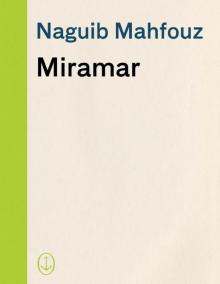 Miramar
Miramar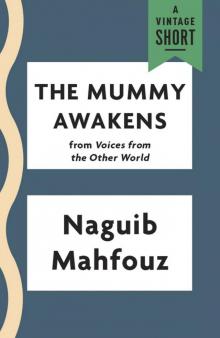 The Mummy Awakens
The Mummy Awakens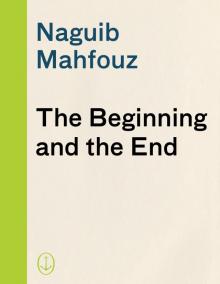 The Beginning and the End
The Beginning and the End Respected Sir, Wedding Song, the Search
Respected Sir, Wedding Song, the Search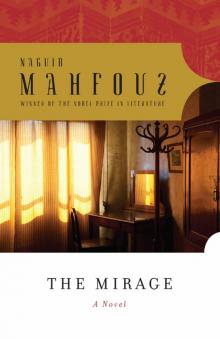 The Mirage
The Mirage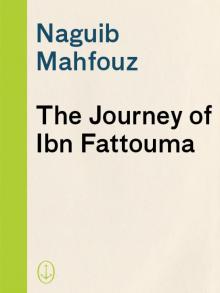 Novels by Naguib Mahfouz
Novels by Naguib Mahfouz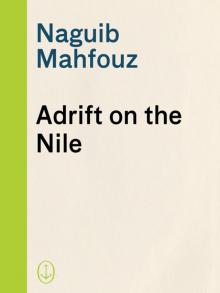 Adrift on the Nile
Adrift on the Nile Karnak Café
Karnak Café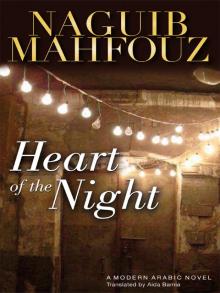 Heart of the Night
Heart of the Night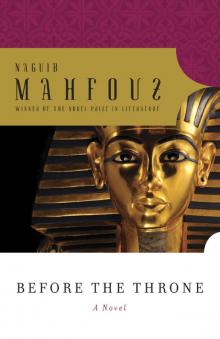 Before the Throne
Before the Throne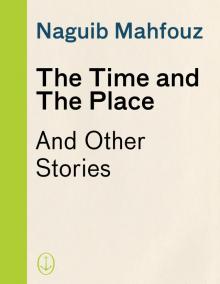 The Time and the Place: And Other Stories
The Time and the Place: And Other Stories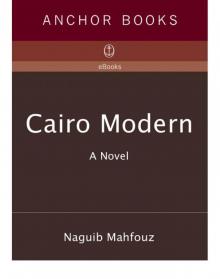 Cairo Modern
Cairo Modern Arabian Nights and Days
Arabian Nights and Days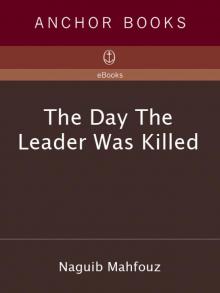 The Day the Leader Was Killed
The Day the Leader Was Killed Morning and Evening Talk
Morning and Evening Talk Three Novels of Ancient Egypt Khufu's Wisdom
Three Novels of Ancient Egypt Khufu's Wisdom Akhenaten: Dweller in Truth
Akhenaten: Dweller in Truth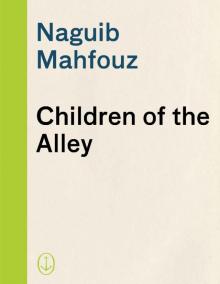 Children of the Alley
Children of the Alley Voices From the Other World
Voices From the Other World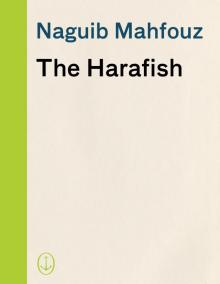 The Harafish
The Harafish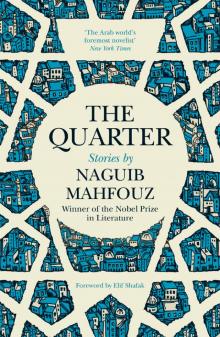 The Quarter
The Quarter The Seventh Heaven: Supernatural Tales
The Seventh Heaven: Supernatural Tales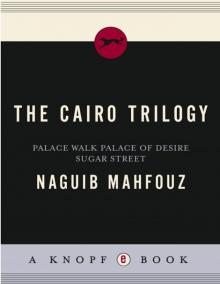 The Cairo Trilogy: Palace Walk, Palace of Desire, Sugar Street
The Cairo Trilogy: Palace Walk, Palace of Desire, Sugar Street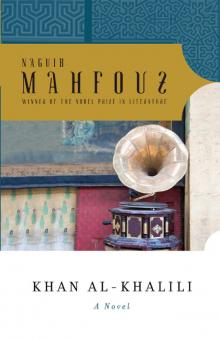 Khan Al-Khalili
Khan Al-Khalili Three Novels of Ancient Egypt Khufu's Wisdom, Rhadopis of Nubia, Thebes at War
Three Novels of Ancient Egypt Khufu's Wisdom, Rhadopis of Nubia, Thebes at War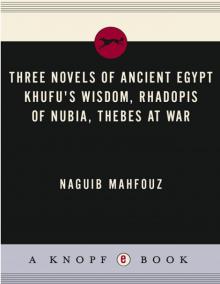 Three Novels of Ancient Egypt
Three Novels of Ancient Egypt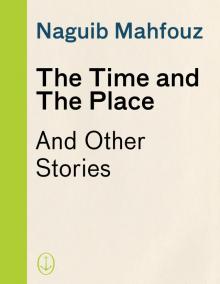 The Time and the Place
The Time and the Place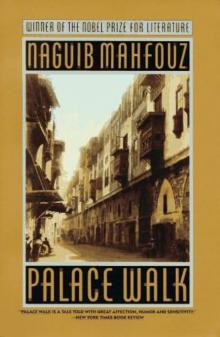 Palace Walk tct-1
Palace Walk tct-1 Akhenaten
Akhenaten The Seventh Heaven
The Seventh Heaven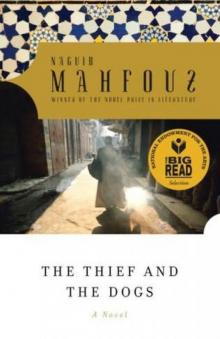 The Thief and the Dogs
The Thief and the Dogs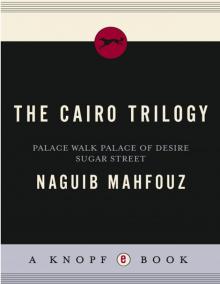 The Cairo Trilogy
The Cairo Trilogy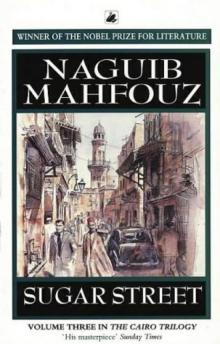 Sugar Street tct-3
Sugar Street tct-3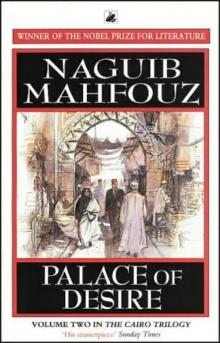 Palace of Desire tct-2
Palace of Desire tct-2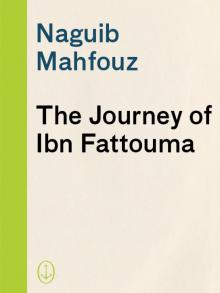 The Journey of Ibn Fattouma
The Journey of Ibn Fattouma